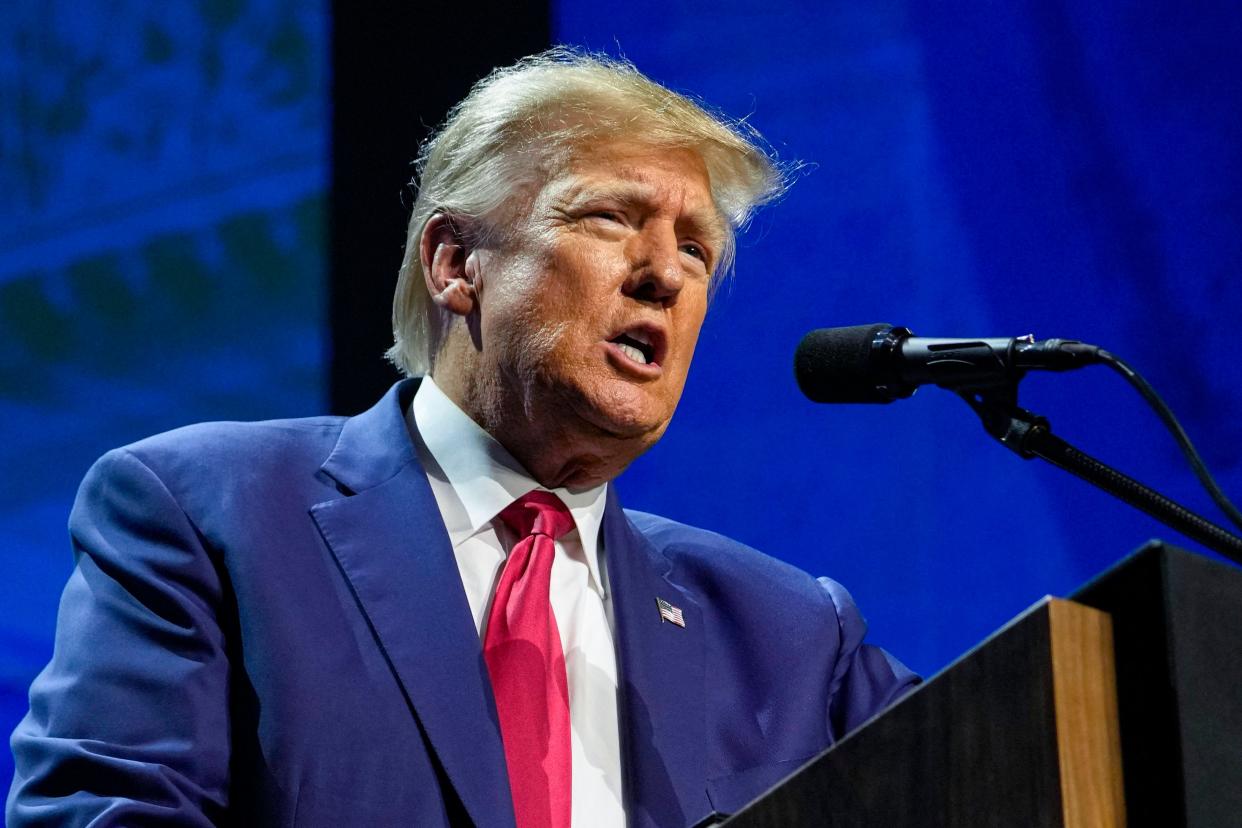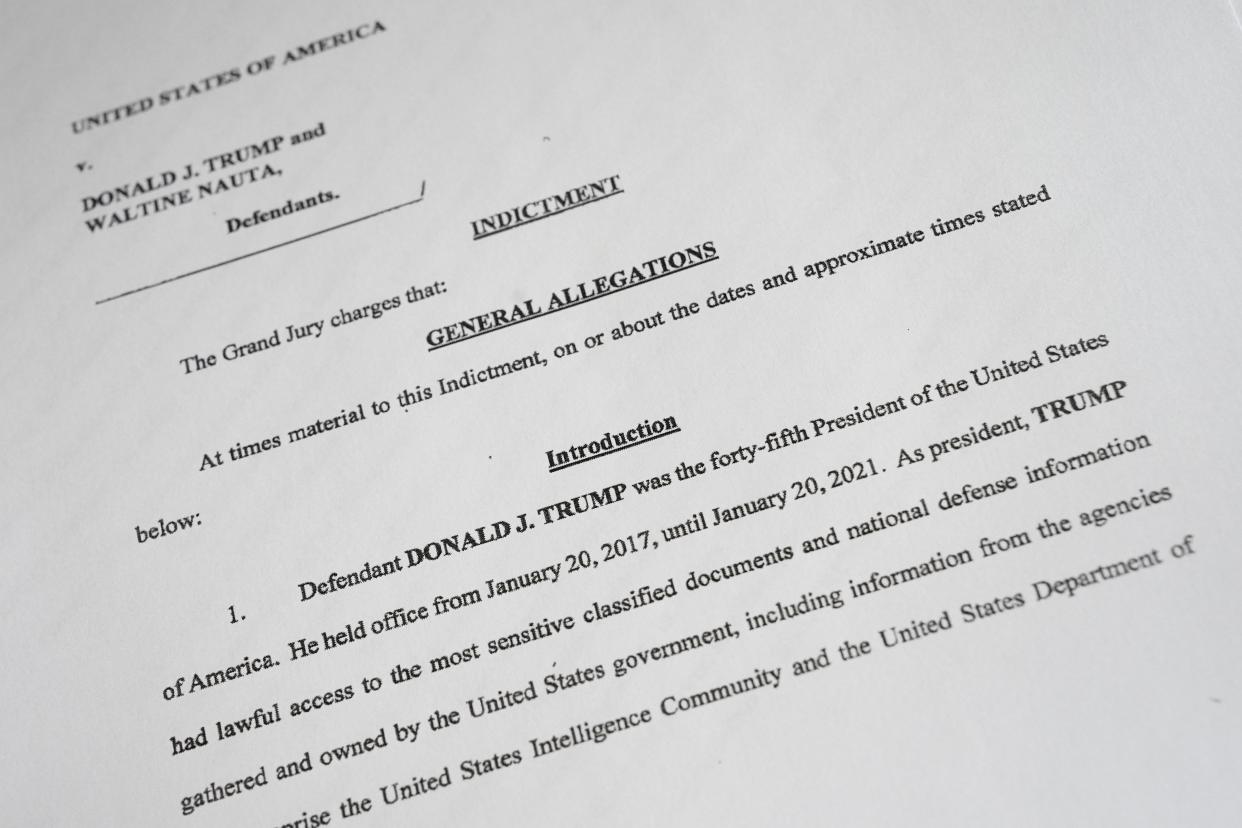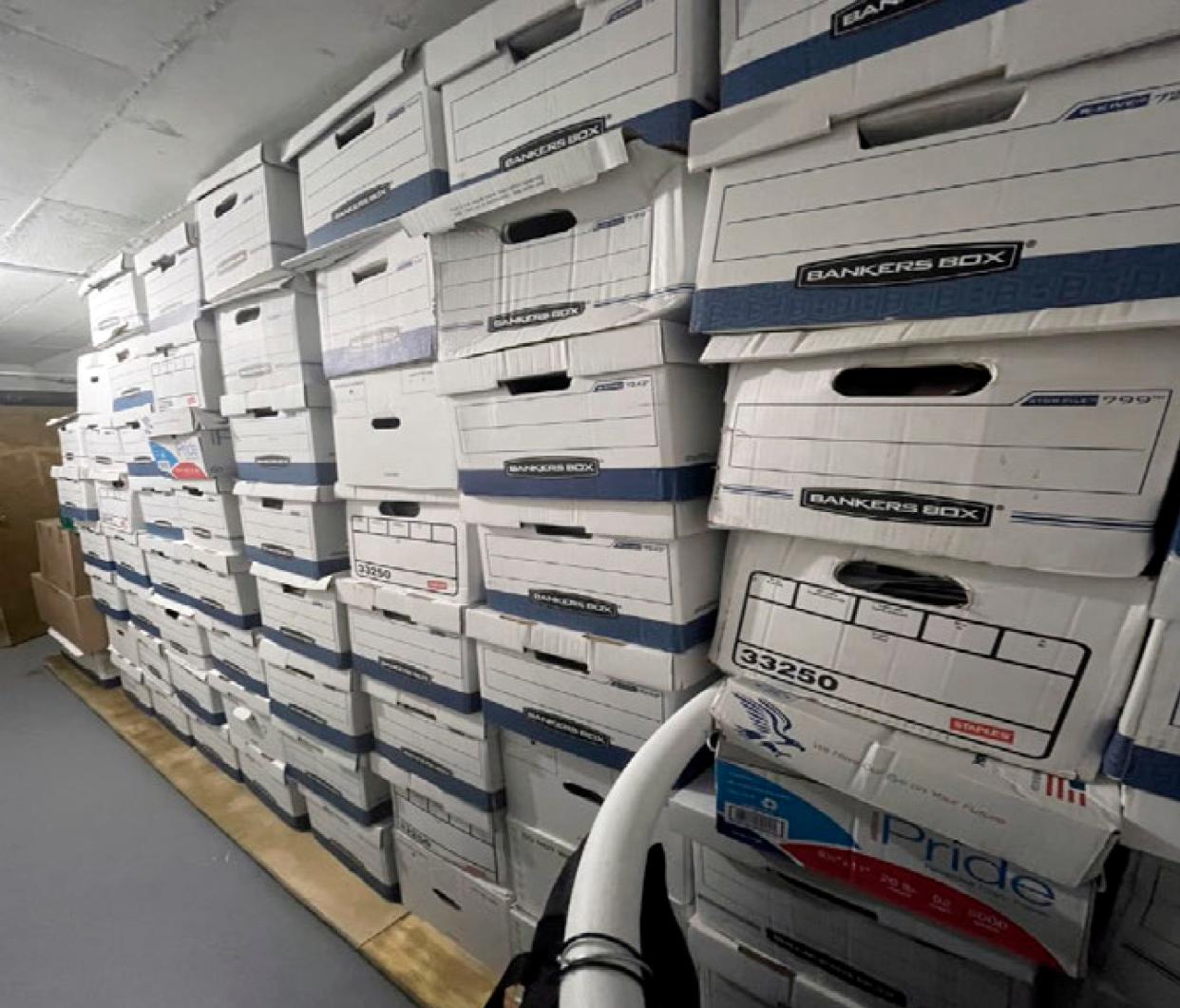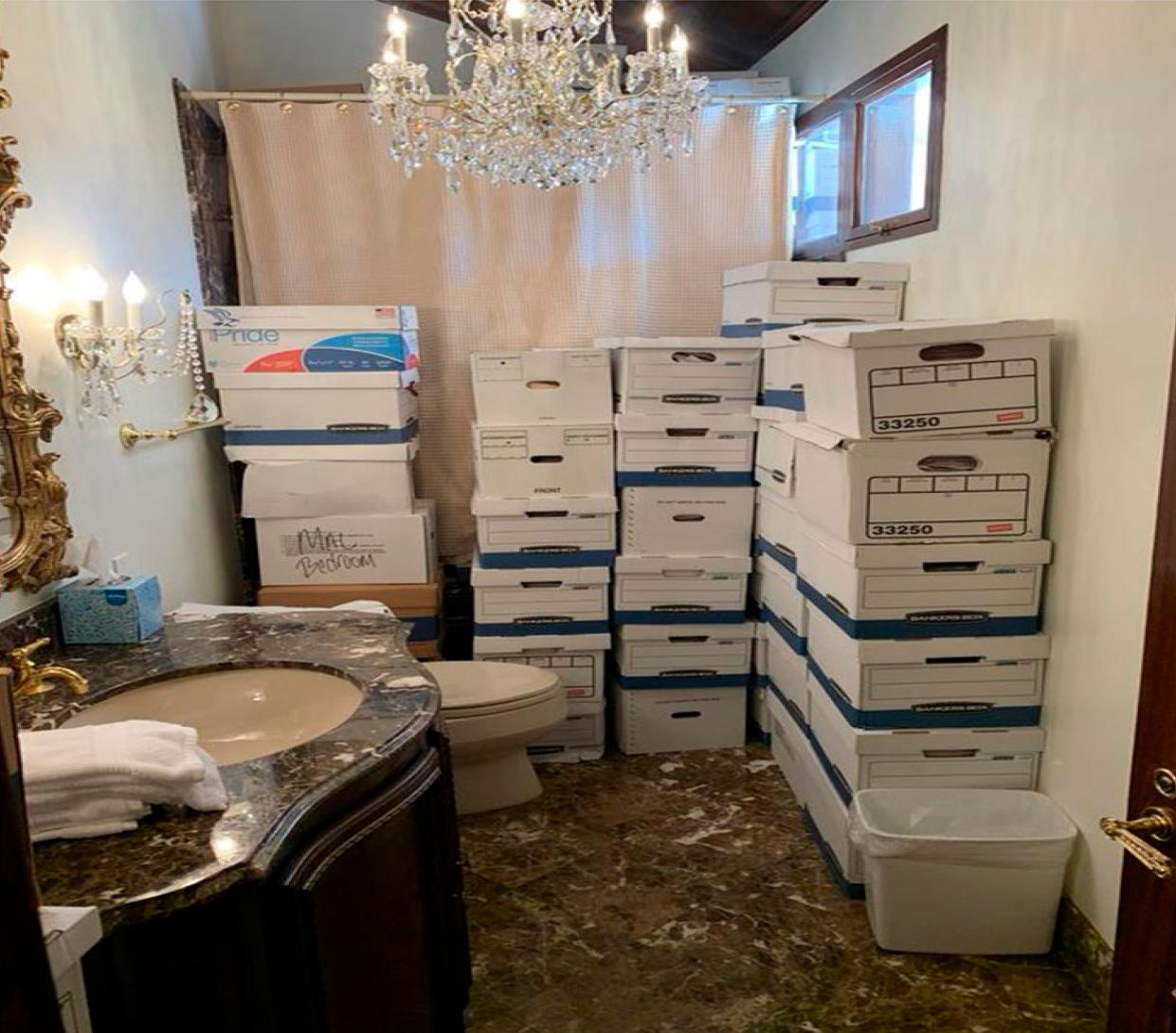'This is secret': Donald Trump indictment details charges against former president
WASHINGTON – Donald Trump and one of his Mar-a-Lago staffers, personal valet Walt Nauta, were charged with dozens of counts of allegedly violating eight federal statutes related to the handling of classified documents after the former president left the White House, according to the 44-page indictment unsealed Friday.
In broad terms, Trump was charged with suggesting his lawyer falsely tell the FBI and grand jury that he didn't have classified documents and directing Nauta to move boxes of documents to hide them from the lawyer, the FBI and the grand jury.
He is accused of not just storing and hiding the documents, but showing them to guests at the Trump National Golf Club in Bedminster, New Jersey. He said one document described a “plan of attack" and another had a map of a military installation, according to the indictment. He allegedly acknowledged knowing the documents were classified, saying "this is still a secret," according to the indictment.
“We have one set of laws in this country and they apply to everyone," said Justice Department special counsel Jack Smith, who led the investigation. "Applying those laws, collecting facts, that’s what determines the outcome of an investigation.”
Trump faces 31 counts of willful retention of national defense information under the Espionage Act. The documents were described as some of the country's most important secrets, including "top secret," requiring special handling, the originator determines who receives the documents and not for release to foreign nationals, according to the indictment.
"The classified documents Trump stored in his boxes included information regarding defense and weapons capabilities of both the United States and foreign countries; United States nuclear programs; potential vulnerabilities of the United States and its allies to military attack; and plans for possible retaliation in response to a foreign attack," the indictment said. "The unauthorized disclosure of these classified documents could put at risk the national security of the United States, foreign relations, the safety of the United States military, and human sources and the continued viability of sensitive intelligence collection methods."
Trump and Nauta each face one count each of conspiracy to obstruct justice, withholding a document or record, corruptly concealing a document in a federal investigation, concealing a document in a federal investigation and scheming to conceal.
Trump is also charged with one count of making false statements and representations for allegedly causing his lawyer to certify that all classified documents had been turned over to federal authorities on June 3. The certification said "a diligent search was conducted" and "any and all responsive documents accompany this certification."
Trump has proclaimed his innocence. His initial federal court appearance is scheduled Tuesday at 3 p.m. in Miami.
Here is what is in the indictment:

Indictment outlines Trump efforts to obstruct justice
The indictment also discloses the depths to which Trump allegedly obstructed justice by not cooperating with – and outright lying to – investigators who were trying to recover the documents.
"Trump endeavored to obstruct the FBI and grand jury investigations and conceal his continued retention of classified documents by, among other things: suggesting that his attorney falsely represent to the FBI and grand jury that Trump did not have documents called for by the grand jury subpoena," the indictment said.
Trump also directed Nauta to move boxes of documents to conceal them from Trump’s attorney, the FBI, and the grand jury, the indictment said. Nauta, a former Navy veteran, decamped to Mar-a-Lago with Trump when left the White House.
Trump also engaged in obstructing by suggesting that his attorney hide or destroy documents called for by the grand jury subpoena, and by providing to the FBI and grand jury just some of the documents called for by the grand jury subpoena, while claiming that he was cooperating fully.
“As a result of Trump’s retention of classified documents after his presidency and refusal to return them, hundreds of classified documents were not recovered by the United States government until 2022,” the indictment said.
The indictment described the three times federal authorities retrieved classified documents from Mar-a-Lago:
On Jan. 17, 2022, nearly a year after Trump left office, and after months of demands by the National Archives and Records Administration for him to provide all missing presidential records, he provided only 15 boxes, which contained 197 documents with classification markings.
On June 3, 2022, in response to a grand jury subpoena demanding the production of all documents with classification markings, Trump’s attorney provided 38 more documents with classification markings to the FBI.
On Aug. 8, 2022, during a court-authorized search warrant, the FBI recovered 102 more documents with classified markings from Trump’s office and a storage room at The Mar-a-Lago.
An unnamed Trump lawyer quoted him after the documents were subpoenaed saying, "I don't want anybody looking, I really don't, I don't want you looking through my boxes," the indictment said. Trump asked, "Wouldn't it be better if we just told them we don't have anything here?" according to the indictment.

Showing classified documents to others
The indictment alleges that Trump showed classified documents to others on two occasions, first in July 2021 at the Trump National Golf Club in Bedminster, New Jersey, and then again sometime in August or September.
In the first instance, Trump showed and described a “plan of attack” that he said was prepared for him by the Department of Defense and a senior military official during an audio-recorded meeting with a writer, a publisher, and two members of his staff. None of them possessed a security clearance, the indictment said.
Trump greeted a writer, their publisher and two staff members July 21, 2021, saying, “Look what I found, this was [the Senior Military Official’s] plan of attack," according to the indictment. Trump reportedly was referring to Gen. Mark Milley, the chairman of the Joint Chiefs of Staff, and his highly classified war plans for engaging Iran.
“I just found, isn’t that amazing? This totally wins my case, you know," Trump said, according to the indictment. "Except it is like, highly confidential. … This is secret information."
A short while later, to his staffer, Trump said, “See as president I could have declassified it. … Now I can’t, you know, but this is still a secret," according to the indictment.
In August or September 2021, at the Bedminster Club, Trump showed a representative of his political action committee – who also did not possess a security clearance – a classified map related to a military operation, the indictment said. Trump also told the representative that “he should not be showing it to the representative and that the representative should not get too close,” according to the indictment.

Trump kept wide array of classified documents: indictment
After his presidency, Trump was not authorized to possess or retain any classified documents, the indictment said.
Former presidents can obtain a waiver of the “need-to-know” requirement if given authority by senior officials in the agencies that originated the documents. “Trump did not obtain any such waiver after his presidency,” the indictment said.
After his presidency, Trump retained documents from the CIA, the Department of Defense and the super-secret National Security Agency, which is responsible for collecting, processing, and disseminating some of the most secret intelligence gathered by the United States, mostly through eavesdropping on U.S. adversaries.
Trump also had in his possession documents from the National Geospatial Intelligence Agency, the National Reconnaissance Office, the Department of Energy and the State Department and its Bureau of Intelligence and Research.

What has Trump said about the investigation?
Trump proclaimed his innocence of criminal charges in a video, statements and on social media.
"The corrupt Biden Administration has informed my attorneys that I have been Indicted," Trump said in the statement Thursday. "I AM AN INNOCENT MAN!"
Trump has argued repeatedly that he could take records with him after leaving the White House, despite the Presidential Records Act giving ownership to the National Archives and Records Administration, and that he had declassified them, despite the lack of documentation for his assertion.
"I have the absolute right to do whatever I want with them," Trump said at a recent CNN town hall.
Contributing: Miles J. Herszenhorn
This article originally appeared on USA TODAY: Trump indictment unsealed: Details of the charges ex-president faces
